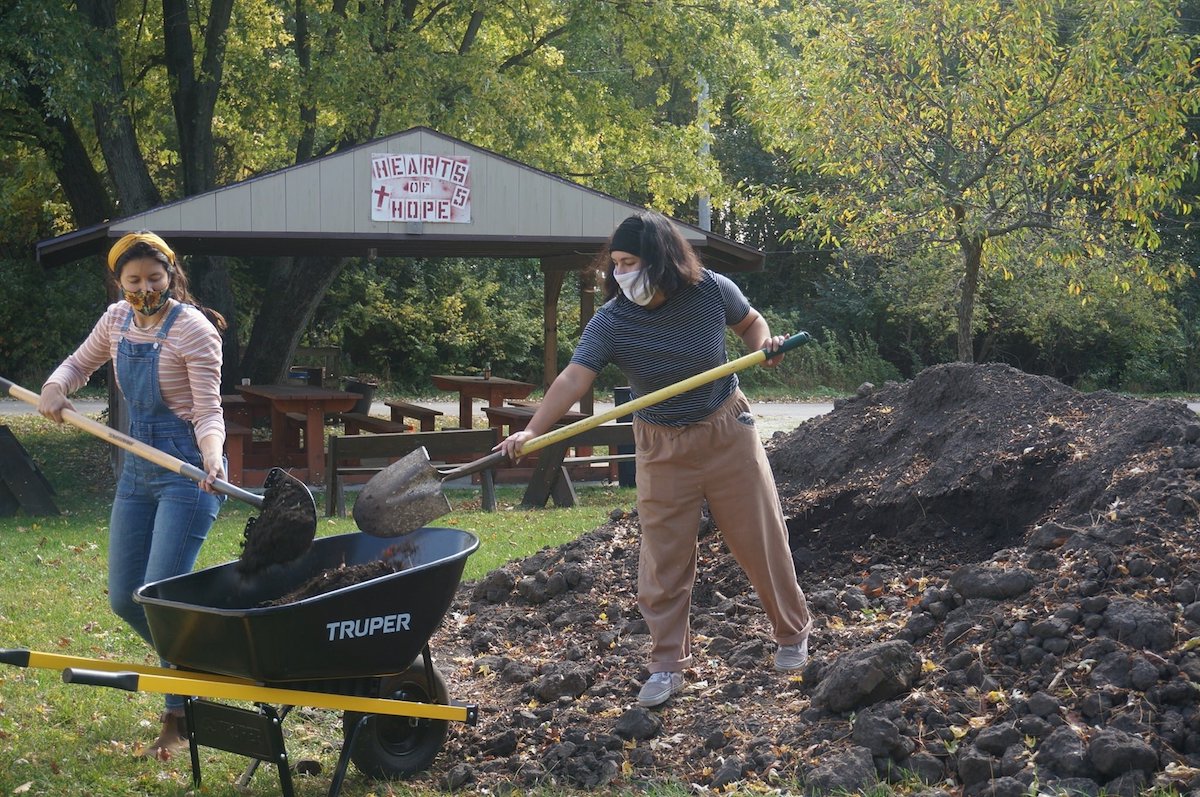CLEVELAND (CNS) — With a parcel of unused land, a small-town Illinois parish has started a community garden to feed the hungry and follow the call to care for the earth in response to one of Pope Francis’ encyclicals.
Known as Jordan River Farm, the project at Sacred Heart Mission in rural Kankakee County is part of the Diocese of Joliet’s Laudato Si’ Ministries program, Kayla Jacobs, ministry director, explained during a prerecorded Catholic Social Ministries Gathering workshop.
The small farm, run by volunteers is helping feed residents of nearby Hopkins Park, population 600, about 75 miles south of Chicago. Jacobs said the project is an example of how local parishes can help implement the pope’s ideas found in “Laudato Si’, on Care for Our Common Home.”
“The reason we felt we needed to address food insecurity is that we as a church are in a strong position to provide food for people who are hungry because we have so much land,” Jacobs said.
She said such gardens can be grown on vast areas of lawn that many parishes have. Not only does such a project provide much-needed food, it helps reduce carbon emissions because there is no longer a need to mow grass, she added.
The diocese’s Laudato Si’ Ministries has reached out to several parishes to encourage the development of “green teams” of volunteers who are working on environmental concerns. Jacobs’ office also coordinates legislative and policy advocacy on environmental issues at the Illinois Capitol and in local communities.
During a live discussion Feb. 7 as a follow-up to the workshop, Jacobs told participants that the goal of achieving climate justice drives the effort.
“Pope Francis wrote to encourage us to hear the cry of the earth and the cry of the poor. It’s very fundamental to addressing the needs of people,” she said.
The workshop also included a presentation by Augustinian Father Arthur Pucaro, assistant vice president in Villanova University’s Office of Mission and Ministry, in which he reviewed the steps being taken on campus for a more sustainable community.
The effort includes action to reduce fossil fuel consumption and carbon emissions and to change lifestyles through reduced plastic usage, implementing a living wage for all workers and even changing food consumption habits by focusing on locally produced food.
In the long term, he said, the goal is to help people take personal action in a bottom-up approach to following the pope’s call to respect the planet. He said the work “is part of our being Christian.”
“We strive to build up community,” Father Pucaro explained. “We have restless hearts. We’re not satisfied with what we’re doing. We’re trying to build a better world for everybody. We’re not talking about what’s being done on campus. We’re talking about a campus for a better world for all.”
The university-wide program regularly seeks ideas from students, parents, faculty, staff and alumni with the goal that people will better understand Catholic social teaching on care for creation.
“God is asking us to share all God’s good gifts with everybody,” he said.
In line with the pope’s call, the Catholic Climate Covenant is coordinating the U.S. effort related to the Vatican’s Laudato Si’ Action Platform, a seven-year undertaking to inspire care for creation among Catholic entities worldwide.
Jose Aguto, covenant associate director, said the platform formally will be introduced May 24. It will encourage pro-active measures to implement the “Laudato Si'” encyclical appropriate to local circumstances, he explained.
Hand-in-hand with the effort is the covenant’s work to mobilize youth and young adults. Anna Robertson, director of the mobilization campaign for the covenant, said her work is designed to inspire young people to take on an even larger role on behalf of environmental protection.
“This particular moment demands our adaptation. It demands our creativity,” she said. “Young people are already leading the way. They are already showing the way forward.”
This year’s virtual gathering of U.S. Catholic social ministry leaders organized by the U.S. Conference of Catholic Bishops’ Department of Justice, Peace and Human Development was co-sponsored by 10 USCCB departments and 18 national Catholic organizations.







